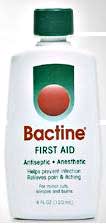Bactine
Jump to navigation
Jump to search
Although it has fallen out of favor with piercers recently, Bactine is still a common part of piercing aftercare for many people. It is a first aid product designed to limit bacterial contamination, and it also includes an anesthetic element. Bactine contains both benzalkonium chloride and Lidocaine.
Piercers' concerns about Bactine include its strength—it can kill healing tissue as well as germs. There is also a warning directly on the label instructing that it not be used on puncture wounds. Finally, bacteria may grow in older bottles of Bactine.
